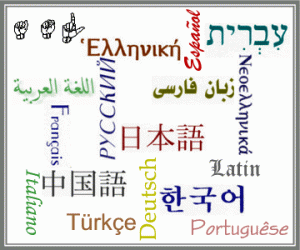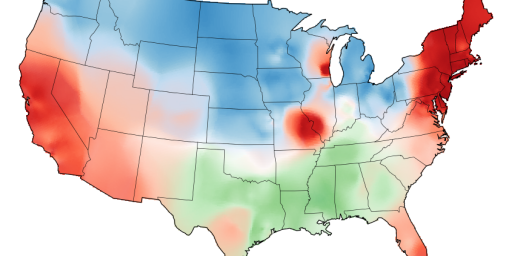Pronouncing Foreign Names
 Jonathan Kolieb is upset that Americans don’t pronounce foreign names in the other country’s mother tongue.
Jonathan Kolieb is upset that Americans don’t pronounce foreign names in the other country’s mother tongue.
I was flipping through the cable news channels the other night, and there were several segments on developments in Iraq. I found myself getting irritated, then angry: Why, five years after occupying a country, do we still not know how to pronounce its name?
[…]
Language and how we use it illustrates much about the speaker’s perspectives on a situation or issue. And it demonstrates a profound disrespect or ignorance (I’m not sure which is worse) to incessantly mispronounce a country’s name. For political leaders or so-called experts to do so with a country like Iraq — whose state of affairs is so intimately tied to America’s own politics and future — is troubling. To continue to do so five years since invading the country is inexcusable.
So before we complain about the need for more Arabic linguists in the State Department, or expanding America’s civilian reconstruction capabilities, let’s start with starting far simpler: Getting the name right.
“ee-Raq.” Not “I-rak.” Or to put it in terms the modern American can relate to: Think “e-Bay,” not “i-Tunes.”
Blake Hounshell takes a more nuanced approach.
He’s got a point. It’s pronounced roughly like ee-Rahk, not eye-Rack. You’d think that by now, most folks would have gotten that right. Ditto for the president of Russia, whose name still seems to confuse the entire political class in Washington.
I’ve noticed, too, that Barack Obama gets himself into trouble when he correctly says “Pah-ki-stan,” but puts too long an “ee” sound on “Taliban” and then says “Afghanistan” in the normal American way.
Still, one can go too far with the whole proper pronunciation thing. “Al Qaeda,” for instance, can come across as incredibly pretentious when pronounced properly, with the infamous “ayn” sound that trips up even the most diligent students of Arabic (ayn is also the first letter in the word “Iraq”). It’s just not practical when speaking English to bust out with what sounds to the untrained ear like a camel with indigestion. Plus, any American who walks around saying “Pah-Ree” is liable to get punched in the face.
And he’d deserve it, too. People–and not just American people–pronounce things using the consonant and vowel sounds they’re used to. I don’t affect a British accent when referring to UK prime ministers or a German one when talking about places and figures in that country. For that matter, I don’t adopt local regional accents when referring to, say, governors of other states or cities in other parts of the country. It would be, at best, unnatural even though I’ve got the ability to do so. Doing it with languages I don’t speak is simply silly.
It was an article of much amusement in the 1980s that one could immediately distinguish conservatives from liberals by how they pronounced Nicaragua. The former would invariably refer to “nicker OG wuh” and the latter would say “knee kaaah RAAAAAAAH goooooooo waaaaa.” Even the left-leaning writers of Saturday Night Live thought that was funny.
In the late 1970s, when Iran and Iraq came on my radar screen, they were commonly pronounced as “Ear-RON” and “Ear-ROCK” by network news anchors and, thus, by the rest of us. Somewhere in the 1990s, perhaps because of the successive presidencies of Texan George H.W. Bush and Arkansan Bill Clinton, they became “Eye-RAN” and “Eye-RACK.” I find myself alternating between them with no rhyme or reason, much as I do with “root” and “rout” as pronunciation of route.
Oh, and “Ear Awk” and “Pak E STAWN”? Those pronunciations have nothing to do native dialects. Rather, it’s the way the British, who colonized the countries and drew their borders, pronounced them. It is, therefore, merely Oxbridge British English.
Graphic by Prof. Lera Boroditsky






Heh, noticed the same thing with Afghanistan.
“Afgan E STAWN”
Well, considering Chinese names puts things in a different perspective. There is simply no way that an English speaker is going to even come close to correctly pronouncing Chinese names without lots of practice. Thus, Chinese names are usually grossly mispronounced. I don’t know of any Chinese people who actually feel offended by this, though.
Compared to Chinese, the degree of mispronunciation that Kolieb is angry about seems minor, and seems to be no more than the degree of mispronunciation of common American places, like “Louisville”.
Hounshel hit the key point square on the head, but failed to take Kolieb to task for it. As he said, the first letter of Iraq in Arabic is the ‘Ayn, which would cause most Americans to choke themselves to death trying to pronounce it.
So Kolieb is either completely ignorant of how Iraq is actually pronounced in Arabic, or he’s glossing over the point (what we call “lying” in Texas) in order to chastise people.
I don’t possess the Arabic skills that John Burgess does, so I’m hoping he chimes in here. I’m curious what he thinks of this.
A very good point. Louisville, New Orleans, and many other cities are pronounced much differently by locals than outsiders. And, shoot, even Missourians can’t agree on how to pronounce Missouri.
shibbeloth
The final consonant in Iraq is also one not phonemic in English.
Pah-ree? Roma? Mahsk-va? Se-bee-ya? Bu-da-pesht?
My own view is that when there are well established English words for places they should continue to be used. We’re speaking English after all, not French, Italian, Russian, Spanish, or Hungarian.
There’s also a landmine lurking in adopting pronunciations of foreign place names: whose pronunciation do you adopt? There are such things as differences in dialects. Do you adopt the pronunciation of the actual residents? The speakers of the majority dialect? You’re going to offend somebody no matter what you do.
So I think that we should stick to English. We can always speak French, Italian, Russian, Spanish, or Hungarian when we’re in those countries.
My own pet peeve is Americans (particularly newscasters) who pronounce every foreign word as though it were French. For example, the second consonant in the place name Beijing is not pronounced like the ‘z’ in azure.
One more point I thought worth making: some of the conventional American pronunciations of foreign place names are Americanizations of 19th century British public school pronunciations which, when pronounced with the 19th century British public school pronunciation, are pretty fair phonetic versions of the pronunciations used by (some of) the local inhabitants. Examples: India (In-juh), Burma (Buh-muh).
You say “to-may-to”, I say “to-mah-to”, yada, yada, yada…
I am curious about the word “portuguêse”[https://www.outsidethebeltway.com/wordpress/wp-content/uploads/2008/08/languages-300×250.gif]. It looks like a strange mix of an English word (Portuguese) with “Português”, is it?
As a former radio type I can tell you that reading a bit of sports copy over the last 20 years or so is a bit of a minefield.
(Which, as an aside is why I always found Matt Frewer in his Max Headroom persona stumbling over Martina Navratalova’s name and finally giving up and saying “That girl oughta get married” to be so damned funny…. well, one reason, anyway)
The problem for your average copy reader is siply sounding it out doesn’t work all that well, most of the time.
Local town pros are just as bad. Examples:
Around here, the town of Chili is pronounced Ch-eye-lie.
Charlotte is pronounced Shar-LOT.
Avon is pronounced with a long A, which makes it sound different than the makeup folks.
Leroy (LaROY) takes on a rather black sounding “LEE-roy”
.. and so on.
When Yankees finally get Biloxi like the natives then perhaps I’ll listen.
I disagree with James about ‘Eye-‘ pronunciations only coming in after the 80s. I heard that pronunciation easily as far back as the early 60s. I’m sure it goes back far earlier in the instance of ‘Eye-talian’, even reaching the point where ‘Eye-Ties’ became a fairly common epithet.
The point made about the ‘ayn and qof sounds (both of which appear in Iraq and Al-Qaeda, btw) is excellent. Neither sound actually exists as a sound in English that can be denoted by either a single letter or letter combination. While the sounds clearly can be made by the human throat, on demand with practice, the only way they make up part of English is in the transitions between different sounds. You need a really sharp ear to catch them. To capture the accurate sound, you either need to use the native alphabet or something like the IPA alphabet. In the words of GHW Bush (or at least Dana Carvey) ‘Ain’t gonna happen’ for English speakers, particularly Americans.
If mangling Arabic is commonplace, what about languages like Polish? ‘CZ’ is commonly replaced by ‘Z’ sounds, as is the case for ‘SZ’. In Polish, they are, respectively, ‘ch’ and ‘sh’ sounds.
I grew up in a part of Massachusetts that had a high proportion of French-Canadian immigrants. The French names were uniformly mangled: Pellesier (pel-es-ee-ay) was more commonly pronounced (pell-is-er), for example. Even the French-Canadian immigrants succumbed to the pressure for uniformity of pronunciation.
I don’t get angry at truly awful pronunciation, figuring that people repeat what they hear or make their best guesses when they’re limited to printed examples. My grandmother, to her dying day, pronounced Thailand as ‘thigh-land’, even after she had visited there.
Throw into the kettle the various pronunciations and linguist rules this nation of immigrants has brought into American English and you’re surely going to get strange results. Which sound is best represented by the letter ‘I’? For most Europeans, that’s actually an ‘ee’ sound; for Americans, it’s ‘eye’. Sometimes the queernesses are regional; sometimes they’re idiosyncratic to the speaker; sometimes they become national.
[You do realize that our saying things like ‘going to the hospital’ is an Irish import? The English say ‘going to hospital’.]
It might be nice if people on the coasts started pronouncing flyover states like Missouri, Arkansas and Illinois like the locals. Please folks, the “s” in Illinois is silent. It’s some kind of Frenchy thing.
Oops, I see James already made my point:
“New Orleans” is proncounced differenty by different residents, and Orleans Parish is prounounced differently still. Generally though there are mainstream proncounciations in Missouri and New Orleans that are reflected in the media. One doesn’t have to pass as an Ozark hillbilly to pronounce Missouri properly.
I think this is much ado about nothing.
I can see a complaint if we were using a completely different name, but languages are tough. Even when you speak the same one-Louisville was one that I was actually thinking about. Also, there is a town in Kentucky called Versailles-we pronounced it Ver-sails. I remember at some point realizing that the palace in France pronounced Ver-sie had the same spelling. It happens. I doubt I would throw a fit though if somebody from France used the French pronunciation.
I think it would be nice if journalists etc tried to use correct pronunciations, but I am not sure it is anything horrible if they fail.
Wonderful example of just what I was talking about, PD Shaw. “Illinois” as pronounced when it was originally transcribed isn’t too far from what the locals themselves said.
As a kid I learned a bit of St. Louis French (long story) which isn’t 20th century Parisian French. We’d have pronounced your example somewhere in between those two you’ve offered, which was a perfectly good French pronunciation in the early 18th century in southwestern France.
No, but you’d probably think that an American who used that pronunciation was either ignorant or affected.
Pronunciation of Hawaii (and most Hawaiian words) is also problematic for most. The Hawaiian pronunciation is something like Hah-vie-ee. When I was growing up in AL most people there pronounced it Hy-why-yuh. Now using the former generally makes you sound affected and the latter like a rube.
Mainland pronunciations of other Hawaiian words are often so far off the mark (even short simple words) as to be nearly to completely incomprehensible.*
Ask a local what languages are spoken in Finland and the Netherlands** and you will almost certainly get very different answers, not just different pronunciations, than an American would give you.
* Use European vowel sounds and pronounce each letter independently and you will at least get close enough to be understood.
** Suomi and Nederlandse
For one thing the second consonant is a labial fricative that isn’t phonemic in English. It also includes a glottal stop that isn’t phonemic in English, either.
Years ago I used to listen to a classical music station back east. I enjoyed to show immensely, but used to say that the host had two accents he used when pronouning foreign names: French and Other.
Oh, and there’s a town in Maine named “Vienna”, which name the locals pronounce as “Vye-Anna”…
Cairo, Illinois is not pronounced like Cairo in Egypt. Kay-ro, as in the syrup is much closer.
American pronunciation of English place names, even those used locally, vary from the English pronunciations (with the exception of some parts of New England, e.g., US: Nor-wich, UK: Nor-ich; US: War-cester, UK: Wis-ter (or Wus-ta).
Maybe a local pronunciation will make me ask the speaker to repeat what he said as I try and figure out how the sounds correlate with the letters I’m trying to spell out in my head, but it doesn’t usually take too long or too much effort. Far more difficult to my ear are some local dialects that can, for example, change ‘beagle hound’ into ‘beetle-ownd’ (WV).
LOL, I beg to differ. I moved to Lexington (right next door to Ver-sails) when I was eight, and my parents and I were very firmly corrected for pronouncing it “Ver-sie.” Also on the pronunciation of “Loo-vul.”
On the larger point though, one thing English speakers fail to recognize when we criticize ourselves for pronouncing foreign words wrong, is that non-native speakers – even those who speak English very well – pronounce little things in English wrong all the time, and most of us don’t really notice it or care. For example, many non-native speakers have a very hard time with the “th” sound in English, because it doesn’t exist in a lot of languages. Depending on where it falls in a word, most fudge it as roughly a “d” or a “t” or a “z” sound. Never noticed? Honestly, I only have because I spent a year teaching English overseas. In general as long as we understand, we don’t notice minor mispronunciations, which is as it should be.
Many surnames that originated in Europe have been corrupted to another name here. Mine is an example. Now spelled “Rhoads”, it was “Rot” or “Roth” in Germany/Switzerland from which the ancestors emigrated in the early 18th century.
The spelling was changed over the years. Auf deutsch, rot (meaning red) is still pronounced like “rote” with a rolled “r” and a sibilant “t”.
I suspect back then, it kind of sounded like “rhoads” does now without the German sounding consonants.
Similarly, at least half of my high school was made up of students of pure Italian ancestry. Most were second generation Italians. All pronounced their names with anglicized vowel and consonant sounds. No one sounded like Luciano Pavarotti singing Rigoletto’s Questa Quella.
I will confess to a certain level of becoming irked when I hear things like ‘cal-zone’ or ‘pro-va-lone’. Even growing up in the US, admittedly in an area with a lot of Italians, I knew it was ‘cal-zo-nay’ and ‘pro-va-lo-nay’.
I’m still working on getting that reaction tuned down to the level at which I can face ‘coup-de-grace’ pronounced ‘coo-da-gras’. I still find it bothersome, though, when it comes from the mouth of a boss….
On the larger point though, one thing English speakers fail to recognize when we criticize ourselves for pronouncing foreign words wrong, is that non-native speakers – even those who speak English very well – pronounce little things in English wrong all the time, and most of us don’t really notice it or care.
I had a professor in college who was from India. He could not make the /p/ sound. For instance family would be “pambly” I can’t remember now if he could do p’s in the middle or ends of words, but he couldn’t at the beginning. I think sometimes it isn’t so much an English sound in isolation but the combination of sounds and the fact the English, unlike most other languages has a lot of vowel sounds.
just me: A lot of consonant sounds, too!
Arabic does not permit three consonants in a row, insisting on interpolating a vowel sound somewhere in the cluster.
‘Strength’ comes out in various ways, mostly something like ‘Is-tren-geth’.
Sort of like the way Americans get tongue-tied over the consonant clusters of Slavic languages. I’m sure you recall the emergency shipments of vowels to the Balkans, no?
Sort of like the way Americans get tongue-tied over the consonant clusters of Slavic languages. I’m sure you recall the emergency shipments of vowels to the Balkans, no?
LOL very true.
Our teeny tiny community in NH ended up with a large community of Bosnian refugees about 8-9 or so years ago. Working in the school it has taken a while to master some of the names. Many of them suffering from a lack of vowels.
I’ll relate this in the hope you find it amusing.
A few years back we were driving up I95 in Maine, headed for New Brunsiwck and Nova Scotia. We noted some black clouds on the horizon, so as is the habit, I reached for my portible scannder and punched up the NOAA transmitter for the area. At the time, they were still using the first generation voice synth units called “Igor” bcause of the odd stilted way it accented things.
Now, because of the huge area to be covered, NOAA had one voice synth unit feeding all the NOAA transmitters in the whole state, and thereby, all the various areas got full reports. Tended to make for a long report cycle, but it got the job done.
Anyway, someone had apaprently made some adjustments to Igor, because when it came to announcing the weather for Bar Harbor, it took on, more or less the local pronunciation;
… “Bah Hahbah”.
I swear, I nearly lost control of my rig, I was laughing so hard. The pro, with the stilted accent was just too much for a road -punchy traveler.
The only Missourian who pronounces it “Miser-rah” is running for office and needs votes in the southern part of the state.